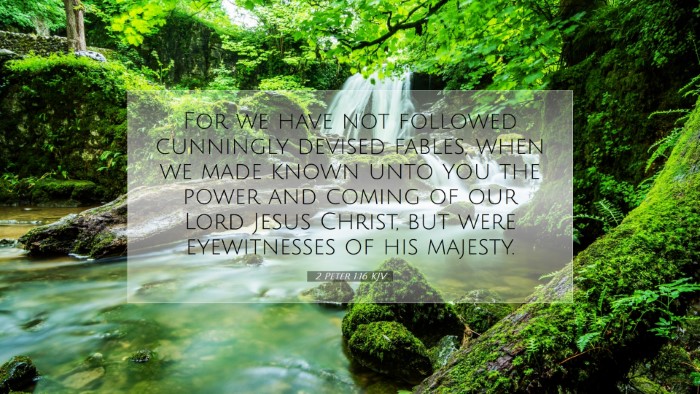Old Testament
Genesis Exodus Leviticus Numbers Deuteronomy Joshua Judges Ruth 1 Samuel 2 Samuel 1 Kings 2 Kings 1 Chronicles 2 Chronicles Ezra Nehemiah Esther Job Psalms Proverbs Ecclesiastes Song of Solomon Isaiah Jeremiah Lamentations Ezekiel Daniel Hosea Joel Amos Obadiah Jonah Micah Nahum Habakkuk Zephaniah Haggai Zechariah Malachi2 Peter 1:16
2 Peter 1:16 KJV
For we have not followed cunningly devised fables, when we made known unto you the power and coming of our Lord Jesus Christ, but were eyewitnesses of his majesty.
2 Peter 1:16 Bible Commentary
Commentary on 2 Peter 1:16
In this profound verse, the Apostle Peter emphasizes the authentic nature of the Christian message he preaches. He opens the discourse by stating, “For we did not follow cleverly devised myths...” which serves as a powerful affirmation regarding the truth of the Scriptures and the teachings of Christ.
Contextual Overview
Understanding the context of 2 Peter is essential for grasping the deeper meanings embedded in this verse. Peter writes this epistle with a serious tone, urging believers to stand firm in their faith against the onslaught of false teachings that were beginning to infiltrate the early Church.
Peter's Authority and Experience
This verse is significant as it reflects Peter's own experiences with Christ, particularly his firsthand knowledge of Christ's majesty. The reference to “we” signifies the apostolic witness, thus anchoring the teachings in lived experience rather than mere philosophical conjecture.
Insights from Public Domain Commentaries
Matthew Henry's Commentary
According to Matthew Henry, Peter’s declaration is a rebuttal against the false teachers who crafted deceptive narratives to lead believers astray. Henry stresses that the nature of Christianity is rooted in real events—specifically, the life, death, and resurrection of Jesus Christ, which Peter personally witnessed. He notes that these “cleverly devised myths” refer to the false doctrines that distort the gospel, emphasizing the necessity for congregants to discern truth from fabrications.
Albert Barnes' Notes
Albert Barnes further elucidates Peter's intent, highlighting the distinction between the truth of the apostolic message and the fabrications of false teachers. He points out that the source of Peter's authority is derived from his encounters with the Lord Jesus Christ during His earthly ministry. Barnes elaborates that the phrase “we did not follow…” reinforces the idea that the apostles’ teachings are based on divine revelation rather than human imagination or tradition.
Adam Clarke's Commentary
Adam Clarke provides a historical perspective, noting that the term “myths” could also be understood in the context of Greek mythology, which was prevalent in the culture surrounding the early Church. Clarke argues that Peter’s strong assertion calls the believers to pursue knowledge and truth, to not be easily swayed by compelling yet empty stories that lack historical credibility. He emphasizes the importance of grounding one’s faith in verifiable truths rather than speculative anecdotes.
The Importance of Eyewitness Testimony
Peter continues by asserting, “...but we were eyewitnesses of his majesty.” Herein lies a radical claim that upholds the experiential basis of Christian proclamation. The implication is clear: the message about Jesus is not merely intellectual assent but is substantiated by the transformative experiences of those who followed Him.
Theological Significance
- Affirmation of Divine Truth: The eyewitness accounts provide a foundation for the truth of the gospel.
- Historical Validity: The shared experiences of the apostles serve as historical anchors for the faith of the early believers.
- Call to Discernment: Peter's remarks urge the Church toward vigilance in seeking truth amidst prevalent falsehoods.
Conclusion
2 Peter 1:16 is a rich verse filled with implications for believers today, echoing the call for sincerity and truth in the pursuit of faith. As pastors, students, theologians, and scholars engage with this text, the importance of an authentic and personal experience with Christ is accentuated. The apostolic witness remains a powerful reminder that Christianity stands firmly on the foundation of lived experiences, profound truths, and divine revelation.
May this commentary serve as a springboard for deeper reflection on the integrity of the Christian message and our responses to the challenges of doctrine that may arise within the body of Christ.


